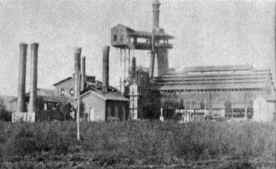|
||
| |
|
John J. Spearman |
biography
|
JOHN J. SPEARMAN, numbered
not only among the oldest residents of Mercer county but also among the
best and most universally known men of the county, is deserving of more
than a passing notice in the history of Mercer county and its prominent
people. In former years Mr. Spearman was foremost among the iron
manufacturers and for many years has been identified with the banking
interests of Sharon. He is a native of Mc Kee’s Gap, Blair county,
Pennsylvania, born there December 17, 1824— more than four score years
ago. His parents were Francis and
Elizabeth (Ambrose) Spearman. The father was born in Kent
county, Maryland, of English origin. The mother was born near
McConnellsburg, Pennsylvania. They came to Mercer in 1852, where the
father died. The mother died at Middlesex and was buried at Mercer. By
occupation, the father was a miller. This worthy couple reared a family
of eight children, of whom two were sons and six daughters. The
early advantages of John J.
Spearman for an education were limited and confined to
two terms in the early-day common schools. But notwithstanding this, by
reason of his large business experience and mingling with men of
letters and affairs generally, as well as through the avenues of
observation, hooks and papers, he has gained a most valuable
information on subjects of general import. Very early in life he was
thrown on his own resources. At the age of fourteen he became a clerk
in the mercantile establishment of David
Puterbaugh, of Woodbury, Bedford county, Pennsylvania.
Here he remained for three years, and then accepted employment in 1841
with Dr. Peter Shoenberger,
a prominent manufacturer of iron in those days, at the Rebecca and
other furnaces and Maria forges, in Blair county, Pennsylvania. Here
Mr. Spearman gained his first practical experience in the manufacture
of iron, and six years were spent in the said employment. In
January, 1847, Mr. Spearman
assumed charge of the business management of the Sharon furnaces, which
was operated at that time by Shoenberger,
Agnew & Co. This position he held for a period of
six years, and in 1853 he purchased the Mazeppa furnace, near Mercer,
Pennsylvania, which he operated until 1859, when he accepted the
position of manager of the Sharpsville furnace, which position he held
for three years. In 1862 he became manager of the iron interests of James Wood & Sons, at
Wheatland, and the following year took, an interest as a partner in the
business, the style of the firm being James
Wood, Sons & Co. This business relation continued
until August, 1870, when it was severed. Mr. Spearman moved to Sharon,
where, in 1872, he organized the Spearman Iron Company and built the
Spearman furnaces at Sharpsville, becoming general manager of the same.
This was a partnership concern up to 1895, when it was incorporated and
in 1901 the property was sold, at which time Mr. Spearman retired from
the iron industry, closing a half century in this business. In i868 he
was prominent in the organization of the First National Bank of Sharon,
the first president of which banking house was
George Prather, who died in the autumn of 1871. He was
succeeded by Mr. Spearman as president of the bank, and this position
he has held ever since January, 1872. March
12, 1851, Mr. Spearman
was united in marriage to Cordelia
Breed, a daughter of Jabish
Breed, of Sharon. Five children were born of this union,
two of whom are deceased: Celesta,
married David Adams; Eva,
at home; Chloe, wife
of W. D. McKeefrey; Francis, who died in 1896; Benjamin, residing at Grove
City, Pennsylvania. Politically, Mr.
Spearman votes the Republican ticket. In Masonic circles
he has long been an advanced Mason and member of the Knights Templar
degree. He was one of the charter members of Sharon Lodge No. 347,
Independent Order of Odd Fellows. This gentleman has passed through a long and successful business career and notes many changes in the production of iron since he first embarked in the business. He has ever been a reliable man, a good citizen and now in his declining years has the satisfaction of looking back on a well spent life, such as may well serve as a pattern for the rising young men, who would do well to follow in his footsteps. Twentieth Century History of Mercer County, 1909, pages 363-364. |
|



